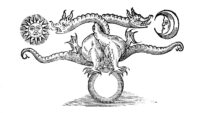Life on planet earth is a complex, adaptive system programmed for growth. Thus despite periodic major extinctions over its long history, earth continues to be populated by millions of species of plants and animals which have variously adapted to a wide range of habitats and fill nearly every ecological niche.
It all begins with the sun, of course, the source of energy upon which life on earth depends. The amount of sunlight reaching the earth is so prodigious that the life process it supports inevitably creates an abundant excess of by-products, physical growth, and reproduction. It is this abundance that has produced the myriad materials upon which life depends and the varying food chains that sustain particular ecosystems. When abundance exceeds the carrying capacity of the environment in which it occurs, it either safely accumulates or promotes the collapse of the living community that has caused it. For example, the oil we use today is the stored abundant excess of living systems that existed hundreds of millions of years ago.
Dealing with the climate effects of the abundant excess produced by a growing population of over 7-billion people presents us with a dilemma. Life’s abundance of continuous growth is natural, which is to say, an inherent property of its complex, adaptive system. Through successive adaptation, life has continued for billions of years, producing a profusion of forms from microscopic to gigantic. Attempting to alter this pattern confronts the reality of nature and the nature of humanity.
The reality of nature changes constantly, although from a human perspective, nature generally appears to change slowly. The coming and goings of ice-ages, for example, have historically spanned tens of thousands of years. The nature of humanity, however, changes rapidly, and of the two, it is the only reality we can fundamentally alter.
The earth’s human population produces abundant excess, as noted by Georges Batailles in The Accursed Share, but its enjoyment is uneven. The vast majority of people scrape out a meager existence, and other than births, produce little in the way of abundance. At the other end of the scale is the small percentage of humanity which produces excess abundance — of food, wealth, material goods, technology, and so forth — and accordingly bear responsibility for despoiling the planet through a socio-economic scheme dependent upon pollution, chemicals, poisons, and greenhouse gasses. Vast expenditures devoted to militarism and war account for the way our abundant excess is foolishly spent through wasteful and damaging activity.
Any chance of evading disastrous global warming requires the advantaged few to undertake major changes; the disadvantaged many have little to offer in the way of lifestyle solutions. Utopian concepts like communism and democracy attempt to address the uneven distribution of abundant excess, but both fail; the first through dissolving the role of the individual and the latter by elevating the same. Both communism and democracy nobly assume that human nature ultimately aspires to equality; as social systems, however, their failings succumb to the reality of nature, which holistically dictates the dynamics of the global adaptive system of living things overall.
While as a species we muddle about arguing over this and that, the living system on earth adapts; the sun continues to shower our planet with its abundance of live-giving energy and as it has for untold billions of years, the earth abides.






Be First to Comment